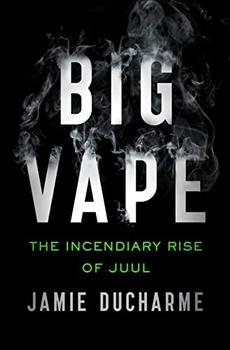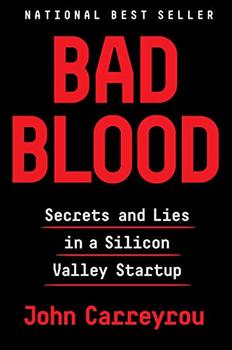Summary | Excerpt | Reviews | Beyond the book | Read-Alikes | Genres & Themes | Author Bio

The Incendiary Rise of Juul
by Jamie DucharmeA propulsive, eye-opening work of reporting, chronicling the rise of Juul and the birth of a new addiction.
It began with a smoke break. James Monsees and Adam Bowen were two ambitious graduate students at Stanford, and in between puffs after class they dreamed of a way to quit smoking. Their solution became the Juul, a sleek, modern device that could vaporize nicotine into a conveniently potent dosage. The company they built around that device, Juul Labs, would go on to become a $38 billion dollar company and draw blame for addicting a whole new generation of underage tobacco users.
Time magazine reporter Jamie Ducharme follows Monsees and Bowen as they create Juul and, in the process, go from public health visionaries and Silicon Valley wunderkinds to two of the most controversial businessmen in the country.
With rigorous reporting and clear-eyed prose that reads like a nonfiction thriller, Big Vape uses the dramatic rise of Juul to tell a larger story of big business, Big Tobacco, and the high cost of a product that was too good to be true.
Ducharme writes in a level-headed, even tone, carefully weighing up her findings as though they were evidence presented in court. She allows for the possibility that in the early days Juul was not so much malicious as simply irresponsible. However, while Bowen and Monsees never actively sought out an underage demographic for their product, the colorful, aspirational aesthetic of Juul's early media campaigns makes its take-up by teenagers seem almost inevitable. Despite multiple warnings that their branding would attract the underage, the company — and Monsees in particular — refused to alter Juul's image. Ducharme's analysis suggests that the spread of teenage vaping could have been avoided, and that Juul is at least partly culpable for a whole new generation of nicotine-addicted young people...continued
Full Review
 (640 words)
(640 words)
(Reviewed by Grace Graham-Taylor).
 In Big Vape, Jamie Ducharme describes an existential crisis at the heart of Juul; while its founders (and many of its employees) saw the business as a tech start-up, to the Food and Drug Administration (and much of the public) it looked like a manufacturer of tobacco products. This distinction is not a mere matter of brand identity — having "tech company" status offers huge advantages to businesses. Many companies covet this privileged label, and there are good reasons why.
In Big Vape, Jamie Ducharme describes an existential crisis at the heart of Juul; while its founders (and many of its employees) saw the business as a tech start-up, to the Food and Drug Administration (and much of the public) it looked like a manufacturer of tobacco products. This distinction is not a mere matter of brand identity — having "tech company" status offers huge advantages to businesses. Many companies covet this privileged label, and there are good reasons why.
In the first place, it comes with a certain prestige. Calling yourself a tech start-up signifies modernity, newness and, importantly, profitability. Inferring connection to Silicon Valley is like dangling bait to investors, even if the association is a vague...

If you liked Big Vape, try these:

by Sophie Gilbert
Published 2025
From Atlantic critic and Pulitzer Prize finalist Sophie Gilbert, a blazing critique of early aughts pop culture.

by John Carreyrou
Published 2020
The full inside story of the breathtaking rise and shocking collapse of Theranos, the multibillion-dollar biotech startup, by the prize-winning journalist who first broke the story and pursued it to the end, despite pressure from its charismatic CEO and threats by her lawyers.